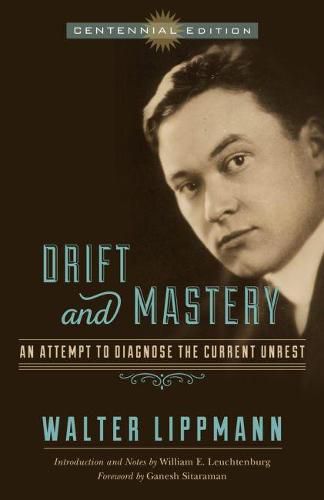Readings Newsletter
Become a Readings Member to make your shopping experience even easier.
Sign in or sign up for free!
You’re not far away from qualifying for FREE standard shipping within Australia
You’ve qualified for FREE standard shipping within Australia
The cart is loading…






This title is printed to order. This book may have been self-published. If so, we cannot guarantee the quality of the content. In the main most books will have gone through the editing process however some may not. We therefore suggest that you be aware of this before ordering this book. If in doubt check either the author or publisher’s details as we are unable to accept any returns unless they are faulty. Please contact us if you have any questions.
In 1914, a brilliant young political journalist published a book arguing that the United States had entered a period of drift -a lack of control over rapidly changing forces in society. He highlighted the tensions between expansion and consolidation, traditionalism and progressivism, and emotion and rationality. He wrote to convince readers that they could balance these tensions: they could be organized, efficient, and functional without sacrificing impulse, choice, or liberty. Mastery over drift is attainable, Walter Lippmann argued, through diligent attention to facts and making active choices. Democracy, Lippman wrote, is a use of freedom, an embrace of opportunity.
Lippman’s Drift and Mastery became one of the most important and influential documents of the Progressive Movement. It remains a valuable text for understanding the political thought of early twentieth-century America and a lucid exploration of timeless themes in American government and politics. Distinguished historian Walter Leuchtenberg’s 1986 introduction and notes are retained in this edition.
In a foreword for the 2014 centennial edition, Ganesh Sitaraman contends, A century later, Lippmann’s classic has much to say to twenty-first century progressives. The underlying solution for our time is similar to that of Lippman’s. We must regain mastery over drift by reforming finance and reducing inequality, by rethinking the relationship between corporations and workers, and by embracing changes in social life.
$9.00 standard shipping within Australia
FREE standard shipping within Australia for orders over $100.00
Express & International shipping calculated at checkout
This title is printed to order. This book may have been self-published. If so, we cannot guarantee the quality of the content. In the main most books will have gone through the editing process however some may not. We therefore suggest that you be aware of this before ordering this book. If in doubt check either the author or publisher’s details as we are unable to accept any returns unless they are faulty. Please contact us if you have any questions.
In 1914, a brilliant young political journalist published a book arguing that the United States had entered a period of drift -a lack of control over rapidly changing forces in society. He highlighted the tensions between expansion and consolidation, traditionalism and progressivism, and emotion and rationality. He wrote to convince readers that they could balance these tensions: they could be organized, efficient, and functional without sacrificing impulse, choice, or liberty. Mastery over drift is attainable, Walter Lippmann argued, through diligent attention to facts and making active choices. Democracy, Lippman wrote, is a use of freedom, an embrace of opportunity.
Lippman’s Drift and Mastery became one of the most important and influential documents of the Progressive Movement. It remains a valuable text for understanding the political thought of early twentieth-century America and a lucid exploration of timeless themes in American government and politics. Distinguished historian Walter Leuchtenberg’s 1986 introduction and notes are retained in this edition.
In a foreword for the 2014 centennial edition, Ganesh Sitaraman contends, A century later, Lippmann’s classic has much to say to twenty-first century progressives. The underlying solution for our time is similar to that of Lippman’s. We must regain mastery over drift by reforming finance and reducing inequality, by rethinking the relationship between corporations and workers, and by embracing changes in social life.